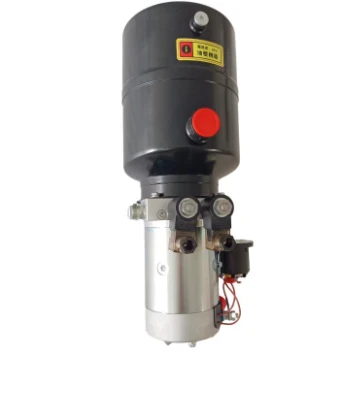Oct . 21, 2024 17:22 Back to list
Oil Hydraulic Cylinder Manufacturing Companies and Their Key Features
The Role of Oil Hydraulic Cylinders in Modern Industry
In the realm of industrial machinery, oil hydraulic cylinders stand as a fundamental component, playing a crucial role in various applications. These specialized devices convert hydraulic energy into mechanical force, allowing machines to perform tasks with precision and power. Hydraulic cylinders are essential in numerous sectors, including construction, automotive, manufacturing, and more, underscoring the importance of oil hydraulic cylinder factories in today’s economy.
Understanding Oil Hydraulic Cylinders
Oil hydraulic cylinders operate based on Pascal’s principle, which states that pressure applied to a confined fluid is transmitted undiminished throughout the fluid. In simple terms, when hydraulic fluid is pumped into a cylinder, it creates pressure that forces the piston to move. This movement can be harnessed to lift, push, pull, or pivot heavy loads, making hydraulic cylinders indispensable in tasks that require significant force.
The Manufacturing Process
The process of manufacturing oil hydraulic cylinders involves several critical steps, each aimed at ensuring the final product meets industry standards for quality and safety. Factories typically source high-quality materials, such as steel or aluminum, to withstand the high pressures and stresses experienced during operation.
1. Material Selection The selection of appropriate materials is pivotal. Manufacturers often choose materials that offer high tensile strength and resistance to corrosion, ensuring longevity and reliability.
2. Machining Precision machining is a crucial stage, where raw materials are shaped into cylinder components, including the cylinder barrel, piston, and rod. Advanced CNC (Computer Numerical Control) machines are often employed to achieve the desired dimensions and tolerances.
3. Assembly Following machining, the components are assembled. This step involves meticulous attention to detail, as the proper sealing and alignment of the piston and cylinder are essential to prevent leaks and ensure efficient operation.
4. Testing and Quality Control After assembly, hydraulic cylinders undergo rigorous testing to assess their performance under various conditions. Factories employ pressure tests, leak tests, and functional tests to ensure that every unit meets the required specifications before it leaves the production line.
oil hydraulic cylinder factories

5. Painting and Coating Finally, the cylinders may be painted or coated to enhance their resistance to environmental factors. This step also serves an aesthetic purpose, as many companies prefer a uniform appearance for their machinery.
The Importance of Oil Hydraulic Cylinder Factories
Oil hydraulic cylinder factories are pivotal to the supply chain of multiple industries. They not only produce the cylinders but also ensure that they adhere to stringent regulations and standards. These factories contribute to the following key areas
1. Innovation Continuous advancements in technology require manufacturers to innovate continually. Factories invest in research and development to create more efficient and durable hydraulic cylinders that can operate at higher pressures or provide smoother movements.
2. Economic Growth The production of hydraulic cylinders supports various industries, leading to job creation and contributing to economic stability. As industries expand, the demand for high-quality hydraulic components only increases, prompting factories to scale their operations.
3. Customization Many oil hydraulic cylinder factories offer customization options to cater to specific customer needs. This flexibility allows industries to design machinery that can meet unique operational challenges, enhancing productivity.
4. Sustainability As the focus on sustainable practices grows, many manufacturers are exploring eco-friendly processes. This includes using recyclable materials and minimizing waste during production, aligning with global trends towards sustainability.
Conclusion
In summary, oil hydraulic cylinders are vital components that drive the functionality of a myriad of industrial applications. The role of oil hydraulic cylinder factories cannot be overstated; they ensure that these essential components are produced to the highest standards of quality, reliability, and performance. As industries evolve and adapt to new challenges, the continued development of hydraulic technology and manufacturing processes will be key to meeting the demands of the future. Whether in lifting heavy construction materials, powering assembly lines, or enabling precision in manufacturing, the impact of oil hydraulic cylinders is profound and integral to modern industry.
-
Fork Lift Power Units - Hebei Shenghan | Efficiency, Reliability
NewsJul.13,2025
-
1.5-Ton Turbocharged Cylinder-Hebei Shenghan|Hydraulic Solution,Energy Efficiency
NewsJul.13,2025
-
Auto Hoist Power Units-Hebei Shenghan|Efficiency&Industrial Lifting
NewsJul.13,2025
-
Double Acting Power Units-Hebei Shenghan|Hydraulic Solutions,Industrial Efficiency
NewsJul.13,2025
-
1.5 Ton Lifting Cylinder 70/82-40-290-535 - High-Performance Hydraulic Solution | Hebei Shenghan
NewsJul.13,2025
-
Fork Lift Power Units - Hebei Shenghan | Efficiency&Reliability
NewsJul.13,2025
